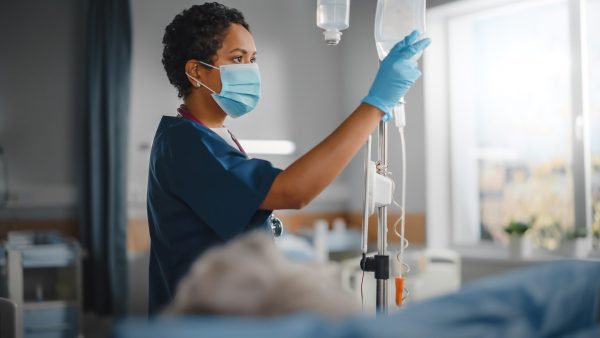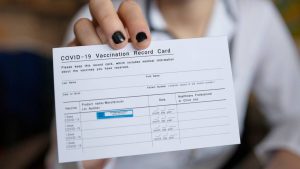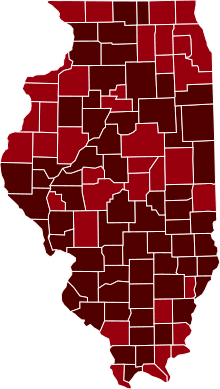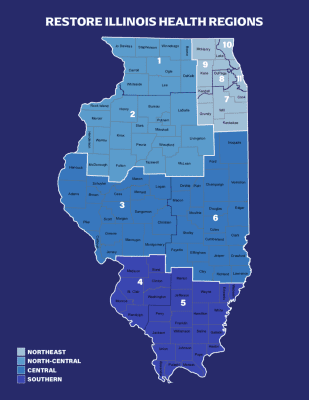BREAKING: Illinois Hits Record-High Covid Hospitalizations; New Restrictions Begin Today
BREAKING NEWS: Illinois hit a new record with 6,294 hospitalized with Covid-related illness as of yesterday — the highest number of hospitalizations since the pandemic began — infections continued to soar, and new restrictions began today in and around Chicago, while some schools continued to announce they’ll start this new semester with remote learning.
Illinois Department of Public Health officials reported 20,866 new covid cases and 30 related deaths Monday, with a daily average of 23,069 new Covid cases and an average 59 Covid-related deaths per day over the past week. The weekend began with a record-high 31,461 new cases on Friday, then tapered as 22,298 cases were reported Saturday and 14,570 new cases were reported Sunday.
The biggest spike has been in hospitalizations, as the Illinois Department of Public Health reported 6,294 hospitalized with covid, a new record high. In addition, one in four of all hospital beds statewide (25 percent) are occupied by covid patients, and 41 ICU beds are occupied by covid patients.

Illinois covid numbers, including of the omicron variant, have been soaring over the past month. (Photo courtesy of the Iowa Department of Public Health)
The cases continue to be dominated by the unvaccinated, as 90 percent of all patients hospitalized are not fully vaccinated, according to data from the Illinois Department of Public Health.
In the meantime, today, new covid restrictions begin around some areas of Illinois on Monday, Jan. 3, and some schools are planning on beginning their semesters this week on remote learning schedules.
For the first time, Chicago as well as suburban Cook County — areas in regions 7, 8, 9, 10 and 11 — will require proof of vaccination for many indoor public spaces for anyone over the age of 5.
The proof of full vaccination will be to dine inside or visit gyms or entertainment venues where food and drinks are being served. Anyone 5 and older must show proof of full vaccination, and anyone 16 and older will also need to provide identification verifying that they are the person matching their vaccination record.

Proof of vaccination will be required in Chicago and surrounding Cook County.
All employees at venues will need to provide proof of vaccination or proof of negative covid testing. The statewide mask mandate also remains in effect for all, meaning that employees and anyone attending an establishment will need to wear a mask.
“Despite our diligent and equitable vaccine distribution efforts throughout this year, unfortunately, our city continues to see a surge of covid-19 Delta and now Omicron cases,” Chicago Mayor Lori Lightfoot said in a statement. “New steps must be taken to protect the health and well being of our residents. This public health order requiring proof of vaccination to visit certain indoor public places is a necessary measure to ensure we can continue to enjoy our city’s many amenities as we enter the new year.”
“This new requirement will not eliminate covid risk, but it will help ensure a much safer indoor environment for fully vaccinated Chicagoans, as well as for the employees working in these higher-risk settings. As we head further into the winter months, we must take this step now,” Chicago Department of Public Health Commissioner Dr. Allison Arwady said in a statement. “With Omicron, I do expect to see many more covid reinfections and breakthrough cases, but luckily the vaccines continue to protect very well against severe illness, hospitalization, and death—and even more so when people have also had a booster shot. I remain most worried about the hundreds of thousands of Chicagoans who still have not received a single dose of covid vaccine nor recovered from covid infection. I’m worried for their own health, but also for the risk they pose to others’ health and to our hospital capacity—and while we are in this concerning surge, we must limit that risk.”
The numbers are spiking as children are getting ready to return to school after winter break. However, some school districts have already announced they will be switching to remote learning.

Illinois has become a new covid hot spot, along with its surrounding states, new data shows.
District 300 in suburban Chicago announced today that they would be closing their schools on Monday and reevaluating if they were going to return on Tuesday.
On the district’s website, the superintendent said, “District staff will use January 3rd to better understand the Omicron Variant’s full impact on staffing and student attendance. Additionally, we hope to receive clarification on the updated quarantine guidelines from the Illinois Department of Health (IDPH) and the Illinois State Board of Education (ISBE) based upon the latest CDC quarantine guidelines. ”
Buffalo Tri-City School District in central Illinois has gone to remote learning through at least Jan. 10.
Virginia School District in central Illinois has announced it will go to remote learning as well, as schools in that district have 32.9 percent of students testing positive for covid or having had close exposure to someone with the virus.
In addition, Pike County’s Pleasant Hill School district in central Illinois is also going remote, due to an outbreak of cases of both covid and the flu.

All of the Illinois health regions have shown rising numbers of covid infections this fall.
Several colleges across the state announced they’ll be going to remote learning at least to begin the next semester in January. Northwestern, DePaul and University of Chicago in Cook County will all begin as remote learning, as will University of Illinois Urbana- Champaign in downstate Champaign and Illinois State University. In addition, Southern Illinois University at Carbondale has told students, faculty and staff that they must test negative for covid-19 within 48 hours of returning to campus, including those who have been vaccinated, and those who have not been vaccinated will have to continue to be tested weekly.
Locally, Rock Island Milan School District 41 also plans to return to in-person learning Jan. 4. They announced on their website, “In the midst of growing concerns about the Omicron variant and high levels of spread in Rock Island County, the school district is still going to be in compliance with masking, social distancing, keeping classrooms clean and sanitized when students return to school on Tuesday, January 4.”
For ongoing coverage of this situation, continue to follow QuadCities.com.









